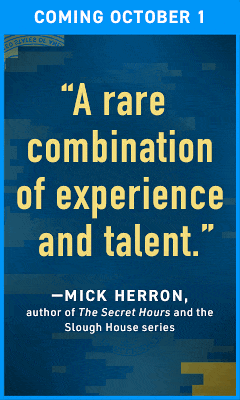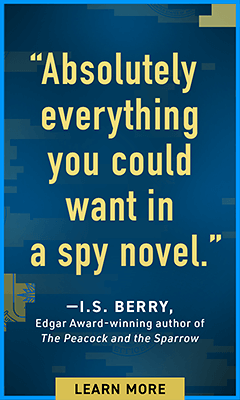The Seventh Floor
by David McCloskey
For his third sensational tradecraft thriller, The Seventh Floor, former CIA analyst David McCloskey returns to some characters fans will recognize--namely CIA officers Artemis Aphrodite Procter and Sam Joseph, who both featured prominently in his debut novel, Damascus Station. McCloskey's ability to balance their strengths and flaws, their dark senses of humor and their exquisitely honed survival instincts make these larger-than-life personalities look almost like the folks next door in their all-too-human foibles.
With her intelligence, reflexes, and risk-taking, Procter would be the person you'd want in charge of any surveillance mission. Except when she figures out that one of her closest friends, with whom she was trained at what the CIA calls "the Farm," must be the mole who betrayed Sam Joseph. Procter has sent Sam to a high-stakes baccarat table in Singapore to get intel from a Russian called Golikov. Golikov winds up dead, and Sam ends up in a Russian interrogation cell; Procter gets viciously fired over the debacle. And those are just the opening chapters. Sam, like Procter, has had his issues with the CIA, but both are passionate about their work and good at what they do. Procter will not rest until she figures out which of her friends--together known as "Bratva"--is the traitor.
McCloskey puts his insider knowledge of the CIA to excellent use, describing "the Seventh Floor," the administrative hub of the CIA, and how files--and secret names--are kept (and leaked), and demonstrates how indispensable a wry sense of humor can be at defusing high tension. As the Bratva gang--Mac Mason, Gus Raptis, Theo Monk, and Procter--await their meeting with new CIA director Finn Gosford and deputy director Deborah Sweet, McCloskey describes the mood: a "room full of nervous analysts, whose fidgeting and tapping and murmuring recalled the rising comprehension of steers on their way to slaughter." Gosford and "Debs," as they refer to her (she was also a classmate at the Farm), proceed to put Procter through "bureaucratic torture" before cruelly dismissing her, whereupon Procter heads to Kissimmee, Fla., to wrestle alligators at her cousin's theme park.
The perfectly paced novel moves smoothly from the Seventh Floor at Langley to Moscow to Kissimmee and beyond, slowly building tension as Procter and Sam (and readers) gain more information about the intricate web of spies and double agents from the East and the West. To McCloskey's credit, the complexities of characters on both sides cause readers to weigh what may have motivated even those it might be tempting to write off as pure villains. Rem, who heads up the counterpart to the CIA in Russia, started as KGB and takes a patient, long view of bringing down the CIA from the inside. His respect for Procter's intelligence can't help but make readers respect him, at least a little: "[S]he is the only one capable of piecing it all together," Rem observes. And his annoyance with the younger, ambitious Bortnikov, who nearly capsizes Rem's efforts through his rush to make an impact, will have universal resonance with readers familiar with corporate heirarchies. Given each character's complexities, McCloskey has a talent for capturing a personality in a single sentence, such as Procter's observation about another Bratva pal: "Theo Monk would have risen far higher inside CIA if not for a hungry cock and thirsty liver."
Even supporting characters, such as Peter and Irene Venable (aka MICKEY and MINNIE), living in Dallas with a dog named Joseph Stalin, can be admired for their patriotism for the Motherland, as the children of Russian immigrants--bloodlust and twisted ethics aside. IMPERIAL, a Russian who defected to Las Vegas after serving as an asset to the CIA, is "an appetite inhabiting a human body," as described by Petra Devine, chief of the Special Investigations Unit (known as the "Dermatology Shop: CIA's molehunters"). But IMPERIAL just might be able to help Procter in her search for her mole. Petra Devine is another terrific supporting character; she starts out as a thorn in the side of the field agents--always pointing out possible anomalies in the information from assets, as recorded in cables the agents send in to headquarters--but her theories become crucial when an actual mole might be undermining the work of the entire agency.
The friendship between Procter and Sam forms the heart of the novel. Their fierce loyalty to each other propels it. Sam tells only Procter what the message was from Golikov; Procter is determined to avenge Sam's imprisonment. Their bond outshines even the 25-year alliances Procter has with Bratva--especially now that she suspects one of them to be the traitor. In a moment of rare self-reflection, Procter tells Gus, "It's a challenge to wrestle your demons and gators at the same time. More of an either-or situation, turns out."
Readers will be rooting for Procter and Sam to find their mole and set the CIA back on track, despite its mishandling of these extremely capable if flawed human beings. Luckily for readers, McCloskey is hard at work on a fourth novel. --Jennifer M. Brown








